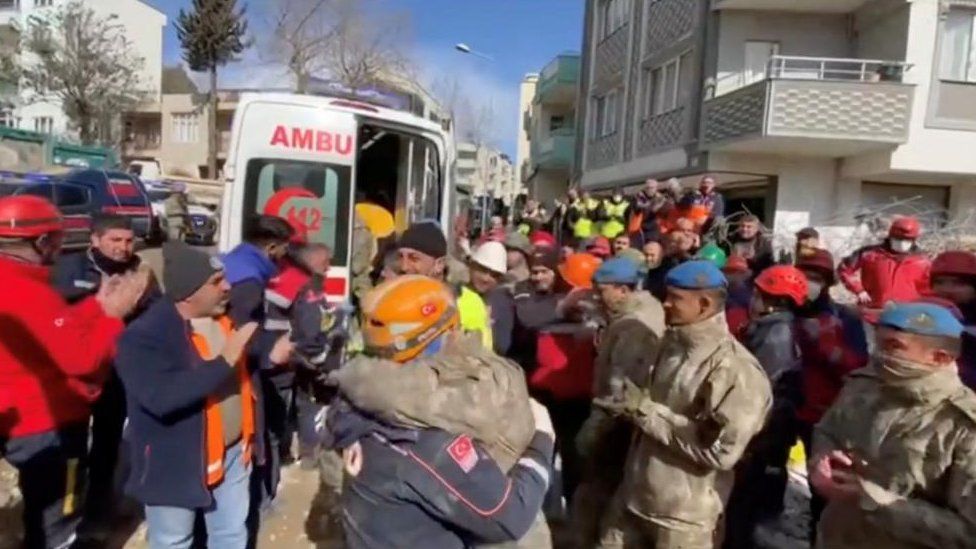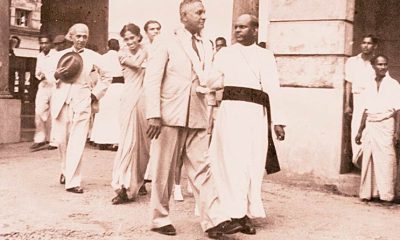Foreign News
Women pulled alive from Turkey quake debris nine days on: death toll passes 41,000

Nine days after Turkey’s earthquake disaster, two women have been pulled from the rubble – alive.
Forty-two year old Melike Imamoglu and 74-year-old Cemile Kekec were saved by rescuers in the Turkish town of Kahramanmaras.Their rescue came as workers turned their attention to cleaning up cities devastated by the disaster.Millions of people across Syria and Turkey are living in makeshift camps and require humanitarian aid.
Video of the rescue posted to social media by the Mayor of Darica, Muzaffer Biyik, showed workers applauding and embracing one another as Ms Kekec was loaded into the ambulance.Local media reported that when they found the 42-year-old survivor, Ms Imamoglu, they told her she was “awesome”.
In Antakya- another Turkish city badly affected by the earthquakes – local media reported that a mother and her two children were pulled alive from the rubble.
Ten days on from the disaster, it is becoming harder to find quake survivors. The combined death toll has now passed 41,000.
Foreign rescue workers who arrived in Turkey shortly after the quakes are beginning to pack up and return home, while locals are shifting their focus to cleaning up the debris.
Survivors must now begin to rebuild their lives. The Turkish government has encouraged people to return to their homes if possible, after authorities have declared they are safe.But many have lost their homes and are living in makeshift camps. In Kahramanmaras, where the women were rescued, more than 1,000 survivors camped in a local stadium.
In Syria, relief efforts have been hampered by the civil war that has divided the country. The UN did not provide aid to Syria for days, saying logistical issues were to blame. When aid did arrive following the opening of a second border crossing through Turkey, rescuers said they did not supply any of the heavy machinery required to remove rubble.
(BBC)
Foreign News
COP29 opens in Azerbaijan for talks centred on climate funding

The annual United Nations climate summit has started in Azerbaijan, with countries readying for tough talks on finance and trade, following a year of weather disasters that have emboldened developing countries in their demands for more funds.
Starting Monday, delegates from nearly 200 countries will be at the two-week COP29 forum in the capital city of Baku for talks being held under the long shadow cast by the re-election of Donald Trump, who has threatened to roll back the United States’s carbon-cutting commitments
n his opening speech, UN climate chief Simon Stiell said that world leaders must show that global cooperation “is not down for the count”.
“Here in Baku, we must agree a new global climate finance goal. If at least two thirds of the world’s nations cannot afford to cut emissions quickly, then every nation pays a brutal price,” he warned.
Stiell also appealed for an “ambitious” new goal on providing climate funding to the world’s poorer nations, saying: “Let’s dispense with any idea that climate finance is charity.”
In welcoming delegates, Azerbaijan’s Ecology Minister Mukhtar Babayev, who also serves as COP29 president, declared that “climate change is already here”.
“COP29 is the unmissable moment to chart a new path forward for everyone.”
The COP29 talks open amid new warnings that 2024 is on track to break temperature records, adding urgency to a fractious debate over climate funding as poorer countries seek an increase in the $100bn-a-year target at the forum.
In an interview with Al Jazeera, Damilola Ogunbiyi, UN Special Representative on Sustainable Energy, said that one of her “key expectations is on the role of climate finance”.
“We have a record-breaking year of investments in clean renewable energy. However, only 15 percent of that goes to the global south,” she said.
Trump’s return also looms over the discussions, with fears that an imminent US departure from the landmark Paris Agreement to limit global warming could mean less ambition around the negotiating table.
“We cannot afford to let the momentum for global action on climate change be derailed,” said Ralph Regenvanu, Vanuatu’s special envoy for climate change and environment. “This is a shared problem that will not solve itself without international cooperation, and we will continue to make that case to the incoming president of one of the world’s largest polluters.”
Outgoing US President Joe Biden is staying away from the talks, as are many leaders who have traditionally appeared early in COP talks to lend weight to the proceedings. German Chancellor Olaf Scholz, who is fighting a political crisis after the collapse of his ruling coalition, has also cancelled his trip to Baku.
Just a handful of leaders from the Group of 20, whose countries account for nearly 80 percent of global emissions, are attending.
Afghanistan will however be sending a delegation for the first time since the Taliban took power. They are expected to have an observer status.
Diplomats have insisted that the absences, and Trump’s win, will not detract from the serious work at hand, particularly agreeing on a new figure for climate funding to developing countries.
Host Azerbaijan will be tasked with keeping countries focused on agreeing to a new global finance target deal to replace the current $100bn pledge expiring this year. How much will be on offer, who will pay, and who can access the funds are some of the major points of contention.
“It’s hard. It involves money. When it comes to money, everybody shows their true colours,” Adonia Ayebare, the Ugandan chair of a bloc that groups more than 100 mostly developing countries and China, told the AFP news agency.
Ayebare brushed aside the potential consequences of a US withdrawal, noting that Trump already took Washington out of the Paris Agreement during his first term.
The talks also come with the latest warnings that the world is far off track to meet the goals of the Paris Agreement.
The climate deal commits to keep warming below 2C (3.6F) compared with pre-industrial levels, preferably below 1.5C (2.7F). But the world is on track to top that level in 2024, according to the European Union climate monitor.
Earlier this year, the UN warned the world is on track for a catastrophic 3.1C (5.58F) of warming this century based on current actions.
[Aljazeera]
Foreign News
New Zealand PM says sorry for ‘horrific’ care home abuse

New Zealand’s Prime Minister Christopher Luxon has formally apologised to victims of abuse in care homes, following an inquiry into one of the country’s biggest abuse scandals.
The historic apology, delivered in parliament, comes after a report found that 200,000 children and vulnerable adults had suffered abuse while in state and faith-based care between 1950 and 2019.
Many of them included people from the Māori and Pacific communities and those with mental or physical disabilities.
The government has since promised to reform the care system.
“I make this apology to all survivors on behalf of my own and previous governments,” said Luxon on Tuesday. “It was horrific. It was heartbreaking. It was wrong. And it should never have happened,” he added. “For many of you it changed the course of your life, and for that, the government must take responsibility.”
The inquiry, which Luxon described as the largest and most complex public inquiry ever held in New Zealand, took six years to complete and included interviews with more than 2,300 survivors of abuse in state and faith-based care institutions.
The ensuing report documented a wide range of abuses including rape, sterilisation, and forced labour.
It found that faith-based institutions often had higher rates of sexual abuse than state care; and civil and faith leaders fought to cover up abuse by moving abusers to other locations and denying culpability, with many victims dying before seeing justice.
The findings were seen as vindication for those who found themselves facing down powerful officialdom, the state, and religious institutions – and often struggling to be believed.
Some survivors and advocates arrived in parliament Tuesday to hear the prime minister’s apology, while hundreds of others tuned in through livestreams across the country. Luxon had earlier faced criticism for delivering the apology in parliament, as that meant many survivors could not hear from the prime minister directly.
Survivors have argued that Luxon’s apology rings hollow unless it is accompanied with proper plans for restitution.
“The effects of that trauma came through later on in life,” Tupua Urlich, a Māori survivor who had given his testimony of abuse to the inquiry, told the BBC’s Newsday programme. “It’s not just the physical abuse, it was the disconnection from my family, from my culture.”
“Justice? No, not yet… These words are nothing unless they’re followed by action, and the right kind of action that is informed by survivors.
“The government have proven that alone they’re not trusted, nor capable, of providing the sort of change and service that we need.”
Details on a restitution scheme are not expected until early next year.
Luxon said Tuesday that while the government works on a new financial redress mechanism for survivors, it would pump an additional NZ$32m ($19m, £15m) into its current system.
The inquiry had made over 100 recommendations, including public apologies from New Zealand authorities and religious leaders, as well as legislation mandating suspected abuse to be reported.
Luxon said the government has either completed or is in the process of working on 28 of these recommendations, but did not give specific detail.
A bill aimed at better protecting children in care had its first reading in parliament on Tuesday, after Luxon delivered the apology. The bill proposes, among other things, a ban on strip searches and greater restrictions on people working with young children.
Luxon also announced a National Remembrance Day to be held on 12 November next year to mark the anniversary of Tuesday’s apology.
“It is on all of us to do all we can to ensure that abuse that should never have been accepted, no longer occurs,” he said.
[BBC]
Foreign News
Mauritius prime minister accepts ‘huge defeat’ in election

The prime minister of Mauritius has accepted that his coalition, L’Alliance Lepep, has suffered a “huge defeat” following Sunday’s parliamentary election.
“The population has decided to choose another team,” Prime Minister Pravind Jugnauth told journalists on Monday.
Jugnauth was seeking a second five-year term, but his main rival, Navin Ramgoolam, leader of the Alliance of Change coalition, looks set to become the next leader of the Indian Ocean archipelago.
Mauritius is known as one of Africa’s most stable democracies but this election was tainted by a phone-tapping scandal with leaked recordings of public figures posted online.
In response, the government issued a social media ban until after the election, although this led to an outcry and the decision was reversed within 24 hours.
Final results are yet to be released but Ramgoolam’s party looks set to win.
“We must respect this choice… and we wish the country and the population good luck,” said Jugnauth.
The vote comes after a historic agreement in which the UK gave up sovereignty over the Chagos Islands to Mauritius.
(BBC)
-

 Features3 days ago
Features3 days agoWhen Sir John Kotelawala visited St. Joseph’s College
-

 Sports7 days ago
Sports7 days agoHow Sri Lanka stunned everyone in the Hong Kong Sixes
-

 Features7 days ago
Features7 days agoA call from university teachers for a commitment to free education
-

 News3 days ago
News3 days agoSL will not be able to join BRICS right now but membership of its NDB bank okayed
-

 Sports3 days ago
Sports3 days agoPathum Nissanka; the ace up Sri Lanka’s sleeve
-

 News7 days ago
News7 days agoWijeweera’s son warns the danger of giving NPP 2/3rd majority
-

 Editorial7 days ago
Editorial7 days agoCPC skirts main issue
-

 Opinion6 days ago
Opinion6 days agoA new dawn for Sri Lanka











